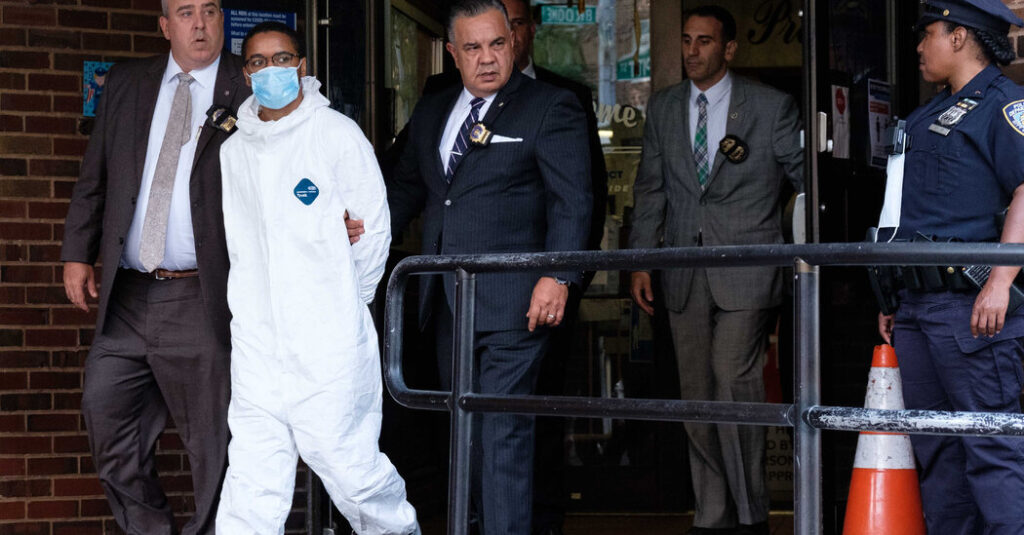Just days after the body of successful tech entrepreneur Fahim Saleh was found dismembered in his luxury Manhattan apartment in July 2020, Saleh's former personal assistant, Tyrese Haspil, conducted a series of disturbing web searches.
“Fahim Saleh.” “Tech CEO murdered in New York.” “Body dismembered.”
The search queries were just some of the grisly details revealed in Haspil's murder trial in Manhattan Criminal Court this month, where jurors found him guilty Monday of stealing hundreds of thousands of dollars from Saleh, then killing him and dismembering his body to cover up the crime.
Haspil, 25, of Brooklyn, is scheduled to be sentenced on Sept. 10.
“Tyrese Haspil tragically cut short Mr. Saleh's life, a man with strong ties to his immigrant family who pursued his passion and became a successful entrepreneur,” Manhattan District Attorney Alvin L. Bragg said in a statement announcing the guilty verdict on Monday. “We hope the accountability demonstrated in today's sentence will bring some comfort to Mr. Saleh's family as they continue to mourn his loss.”
Saleh, 33, was born in Saudi Arabia to Bangladeshi parents and grew up in Poughkeepsie, New York. He was the founder of two bike-sharing companies based in Bangladesh and Nigeria, the latter of which raised millions of dollars in venture capital. After his death, he was remembered as an innovative businessman and a generous friend.
Haspil's lawyer, Sam Roberts, said Monday he was disappointed with the sentence. He acknowledged Haspil committed the crime and said the perpetrator was remorseful. “We believe that this is not the worst thing Tyrese Haspil has ever committed in his life,” he said. “We hope the court understands that there are mitigating factors here.”
Haspil's ill-fated scheme began in the fall of 2018, when he was working as Saleh's startup assistant and began stealing money from Saleh's company to buy lavish gifts for his new girlfriend.
By December, Haspil had set up fake legal entities and bank accounts and funneled even more money into them.
Prosecutors say Haspil quit his job as Saleh's assistant in May 2019 out of fear of being discovered, but the amount of thefts continued to grow.
Sure enough, Haspil's scheme was uncovered in January 2020, when Saleh confronted him about a $35,000 debt and offered to settle with a two-year repayment plan rather than pursue criminal charges, according to prosecutors.
Mr. Haspil agreed. But Saleh didn't know that Mr. Haspil had stolen much larger amounts in a separate scheme using fraudulent PayPal accounts. While continuing that scheme, Mr. Haspil began paying Mr. Saleh back with stolen money, eventually amassing about $400,000 in stolen funds, according to prosecutors.
Prosecutors said Haspil was concerned that a more lucrative theft would also be discovered and began plotting to kill Saleh to prevent him from testifying against him in a criminal case.
What followed was a murder so meticulously researched and executed that some investigators speculated at the time that Hapsill may have planned it to look like a professional assassination.
Prosecutors said Haspil spent weeks researching the techniques, weapons and cleaning supplies needed to carry out and cover up the murder, bought clothes to disguise his identity and tracked Saleh's location on social media in preparation.
In May of that year, determined to kill Saleh at his home, Haspil conducted two further web searches: on the anatomy of the human neck and on Saleh's architectural blueprints. In June, he bought contractor garbage bags and a Swiffer. Floor cleaning tools and saw.
Then, in the early morning hours of July 13, Haspil, wearing a black suit and an opaque face mask, entered Saleh's Manhattan apartment, followed Saleh into an elevator that led to his apartment, where he subdued him with a Taser and stabbed him to death.
He left the apartment, returning the next day to dismember Mr Saleh's body with an electric saw, but then went out again to buy a charger. While he was out, Mr Saleh's cousin went to check on him and discovered the scene.
Haspil was arrested four days after the murder took place at an Airbnb he had booked for his girlfriend's birthday celebration.

